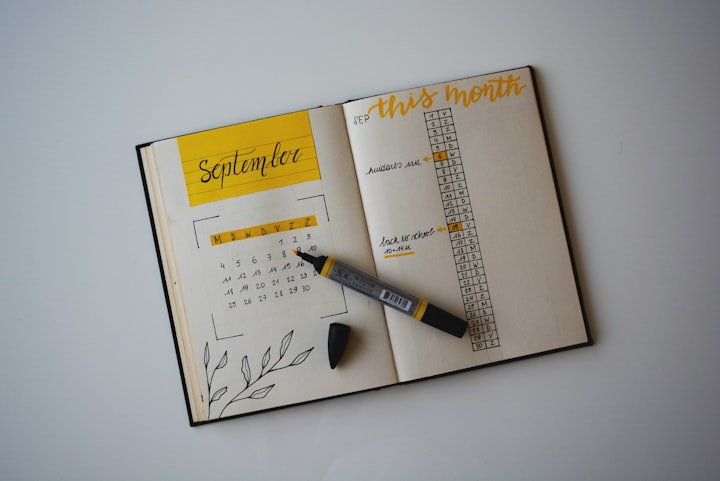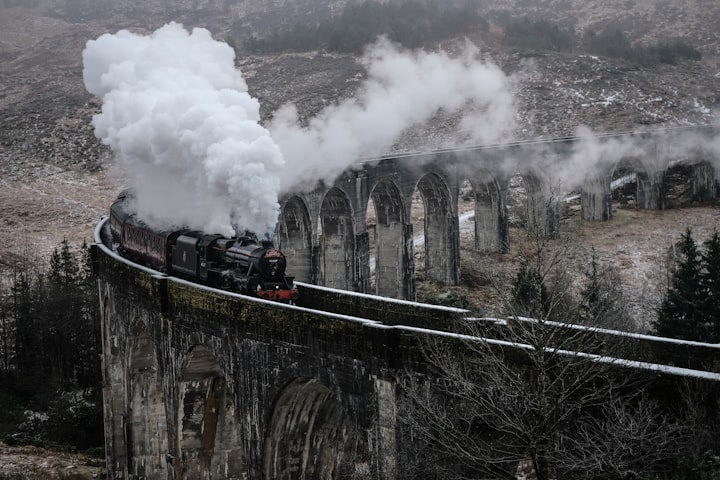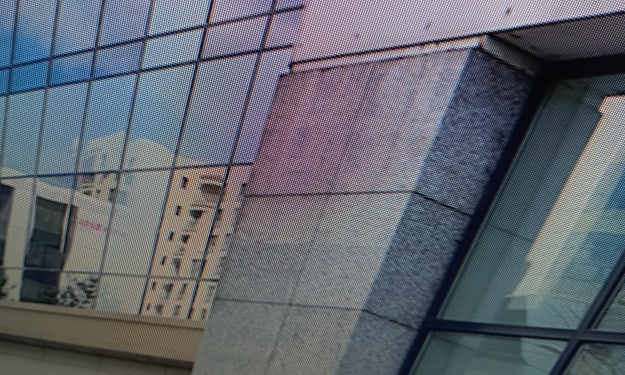
April already. That morning snow fell unexpectedly, covering the daffodils in a delicate white drift, and, for a while, returning us to winter. That day too, my uncle died unforeseen. He left me something: an inheritance, though it took a little time to get it—and longer to learn what it was worth.
At first, I had no idea even what it was. It dropped onto my mat, looking like a book, but it wasn't a book, not exactly. It was a journal.
It came wrapped in brown paper, with a covering letter, but before I unfolded it, I flipped open the journal. It was small: hard-backed, thirteen by twenty-one centimetres, dotted design, made by Moleskine and covered in densely-packed writing, written with a black fountain pen. The handwriting was familiar, but I didn't place it immediately.
The solicitor's letter made it all clear. The journal was a gift from my Uncle Adrian.
Adrian was my father's younger brother. We were in touch each Christmas by card, only a line or two, but now it was Spring, and he was dead. He'd left me this. Most curious.
Adrian gave his house to a charity but sent me his journal. It came with the cryptic message that there was treasure contained inside. What treasure?
I showed it to Jenny, and we shook the journal upside down, but nothing fell out. She laughed., "Were you expecting a golden ticket?"
"I don't know, but where's the treasure?"
She shrugged. "Inside the book."
I tapped the cover. "It's probably a puzzle. He was mad about puzzles."
And then I sat down to read.
Uncle Adrian was a meticulous man. He compiled lists of things to do and each day recorded the weather, his weight, his waistline, what birds he'd seen in the garden, stock prices, his thoughts on politics and odd bits of poetry.
There were weird marks on the paper's edges: straight lines and diagonal lines, some slanting up and some slanting down. They might be simply decoration.
On the entry for my birthday, after noting he'd seen a charm of greenfinches and that his shares had gone down, there was a note.
"John," he wrote. "I want to leave you fourteen thousand, three hundred and sixty-seven pounds. I know you are struggling at the moment, and this money will be helpful, but remember, money isn't the most important thing."
Jenny stroked my head. "I only met him a few times, but he was a lovely old man."
I said, "Fourteen thousand, three hundred and sixty-seven pounds is a very odd amount to leave anyone."
That night, we were watching a programme about George Washington, the First President of the USA, when it came to me, "It's about twenty thousand dollars."
Jenny said, "So he wanted to leave you twenty thousand US dollars?"
The Moleskin journal was open on my lap. "I bet that's what it was."
Under where my finger was, Uncle Adrian had written:
"PS: Don't forget your grandfather was Irish."
Grandpa James, my father's and Adrian's dad, was from Dublin. But what had that to do with anything?
One night I flicked through the journal again. Along with the lists and observations and recordings, were memories.
"That day," Adrian had written. "Paul and I went to the beach. Every day we went, and every day we swam, no matter how cold, and believe me, the Irish Sea is cold, even in summer. What fun we had! We built sandcastles and dams across rivulets of water that snaked over the sand. We fished in pools and found shrimps and sea anemones and tiny dabs that tickled your feet and fluttered away if you stepped on them.
After the long day, mother came and fetched us, and we had ice-cream, and our skins glowed with the salt and sunshine as we walked our Toby dog. And at night, father read us Just William stories until the moths came, fluttering about the gas lamps, and the moon rose, and the curlews called far away. I miss my brother, Paul. He has been gone too long, but soon I will see him again."
I sat there reading his words, and wept for my father and my uncle and their long-ago boyhood, lost now beyond remembrance.
My grandfather was Irish.
What was that to do with anything? They hadn't holidayed in Ireland. Grandpa James settled in Whitehaven, and they holidayed up the coast in Allonby. They took a cottage every year there and spent all summer on the beach.
At precisely three-thirty in the morning, I woke from a dream. "It's Ogham", I said and snapped on the lamp beside my bed.
Jenny struggled from the sheets beside me. "You what?"
"That's what he was going on about the Irish connection. On the page edges, it's the Ogham alphabet."
I grabbed the little black book, then got my phone and Googled the Ogham alphabet. That's what it was. The marks on the page edge spelled something. I reached for a pen and paper.
"You're not doing that now," Jenny said.
"It's worth twenty thousand quid."
"Dollars," she corrected me. "Not as much."
"Still, we need the money."
"Not now. It's the middle of the night."
I groaned but put the Moleskine book back and switched off the light. Jenny was right. She usually was, but I didn't like to tell her that because it encouraged her to be even more righter even more often.
I translated the Ogham the next day. It said, "The treasure is where your father and I found it, long ago in Allonby.
Uncle Adrian was so meticulous that he'd even recorded the address of the house my grandparents took every year: The Bank House.
Jenny couldn't get the time off work, so I went on my own. The train took four hours to get to Carlisle. I took another train to Maryport and a bus to Allonby.
I had a reservation at the Ship Inn and left my bag there. I asked where The Bank House was, and the landlord told me. First I went to walk on the seashore.
The tide was out revealing acres of sand. The wind whipped white tops on the waves that rolled in from Scotland and Ireland and further. They came from beyond the line where the waves and clouds met, perhaps even from America.
Two boys played on the sand, digging sandcastles. They were having a rare old time, and the towers they made were high and strong. A shrimping boat halfway out caught my attention for a while and when I turned back the two boys, brothers perhaps, were gone.
Time to face up to the owner of The Bank House. I would ask her whether she knew anything about treasure. She might call the police, but this was my best lead.
I walked over the cobbles, clearing my throat, rehearsing what I was going to say. Stopping a few feet away, getting mentally ready, pushing my hand through my hair to look a little more respectable, and still expecting outrage or ridicule, I studied the bright blue door with its shiny brass knocker and rapped.
No one came. I looked at the windows. Maybe they weren't in? With a heavy sigh, for it was a long way to come for no avail, I knocked again.
More silence from inside and the sound of gulls mewing overhead and the wind in the grass. A woman pulled back the door an inch and said, "Yes?"
I smiled sheepishly. "Well, it's an odd tale, but today I've come a long way." I had the Moleskine journal in my hand. "And— "
"You're John Molloy?"
I swallowed. "Yes."
"I'm expecting you. Come in."
It seemed Uncle Adrian had written to Mrs Graham, telling her to expect me. This young Mrs Graham was the grand-daughter of the lady who'd had the house in the 1950s.
"Come through, come through. Here it is."
We entered the back kitchen, and there, on a table, was an old-fashioned safe.
"A safe?"
She nodded. "It's been here years. Your family used to keep their valuables in it. I'd forgotten about it until he wrote. We didn't use the old thing. No one knows the combination."
I saw that it had a wheel combination lock with numbers around the edge. I pulled a face.
"He said for you to take it. It belongs to your family, anyway. It's quite sturdy", she said. "You'd need a pickaxe or welding gear to get into it."
"And that would destroy the money."
She raised an eyebrow. "There's money in it?"
"Oh, I don't know. But there's something in it."
She nodded wisely. "There's something in it all right."
The safe was old and heavy, but I managed it in two hands, waddling back to the Ship. The next day, I had a full English breakfast called a taxi to take me to the station.
Back home, Jenny stared at the safe. "How are you going to get it open?"
I shook my head. Three days it was on our kitchen table, looking at me.
On the fourth day, I said, "It seems there's more puzzling to do," and I went back to the Moleskine.
Right at the back, I found notes on letter-to-number substitution codes. Adrian had underlined the title in green ink. That had to mean something. I sat sucking my pencil.
Jenny said, "The safe opens with a number?"
"Yes."
"And this substitution code changes letters to numbers?"
"Sure."
"So, what memorable word could you convert into numbers and so open the safe?"
"I don't know."
"Try your dad's name."
I converted 'Paul' to numbers. "Too short."
I tried Adrian, then John, but they were too short as well.
"Also," I said, "Some letters have two numbers, so 'u' for example is 21. What to do about that?"
"Add them together, so U as 21 becomes 3."
"Smart."
But we got no further.
We went to bed.
The little black book was driving me crazy. I read through Adrian's lists and thoughts and memories, but couldn't figure it. The records of the birds were interesting, but the nicest parts were his reminiscences and the fondness he had for his brother, and the times they had in Allonby.
I don't know why I didn't get it straight away. I said to Jenny, "I'm going to try: Allonby."
1-12-12-15-14-2-25. That was too long, so I tried Jenny's method: 1-3-3-4-2-7.
The safe clicked open. With hesitation, I reached in. My fingers touched, not banknotes, not a cheque, but an old black and white photograph. I pulled it out and stared. It showed two little boys in shorts digging a sandcastle on a big beach. On the back, it said:
"Paul And Adrian, Allonby, July 1950."
A week later, we got a cheque from the solicitor for the peculiar amount, equivalent to $20000, signed by my uncle.
Jenny said, "So the money was never in the safe?"
I rubbed my chin. "I guess not."
We paid off our bills with the money, and I got the photograph framed and hung it on my wall. I stood back and stared at the two brothers who had no idea then what life had in stock for them, but on that sunny day, long ago, on the beach, with their sandcastles, they were content with what they had.
My uncle was a very organised man, every little detail was in his small black Moleskine book. He'd written:
The treasure is where your father and I found it, long ago.
The cash was useful, but the real treasure Adrian found and left for me, wasn't money, it was love.
I looked at Jenny, who'd brought me a cup of tea, and I stared and stared at her, and she said, "What?"
I shook my head. "Nothing. Just you."
About the Creator
Tony Walker
I produce The Classic Ghost Stories Podcast, and I write my own ghost stories which you can find on Amazon.
I write non-fiction articles on the haunted tourism, paranormal, health, supplements and nootropics.






Comments
There are no comments for this story
Be the first to respond and start the conversation.